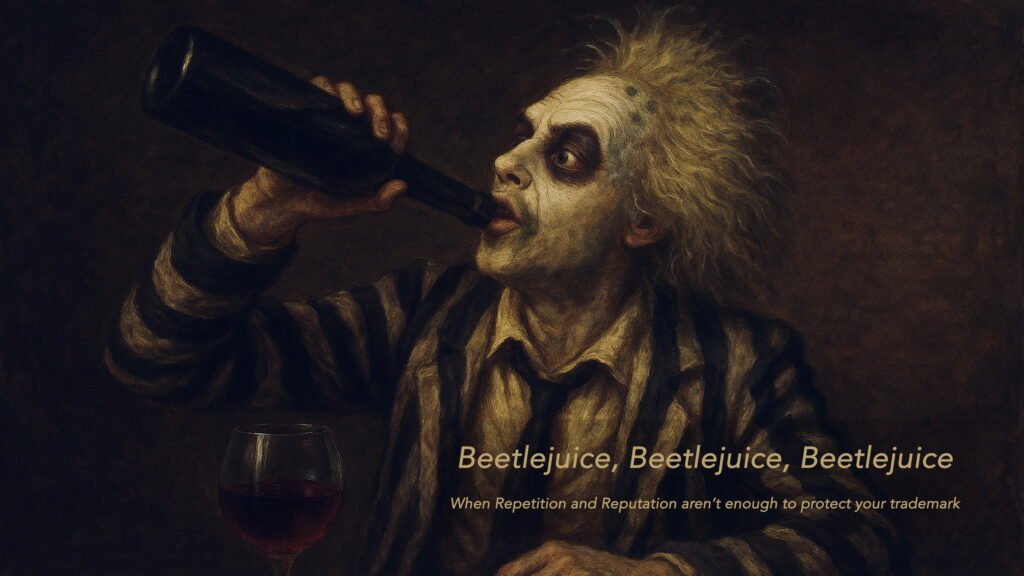Beetlejuice, Beetlejuice, Beetlejuice: When Reputation Fails
Many small business owners and brand creators believe that once a name becomes well-known, it’s automatically protected from copycats. But trade mark law doesn’t work that way. Trade mark registration only protects your brand for the goods and services you claim, or for goods and services that are closely related.

The recent case of Warner Bros Entertainment Inc v Casella Wines Pty Limited [2025] ATMO 50 is a strong reminder that even one of the world’s most recognised entertainment companies couldn’t stop an Australian wine business from registering the same name in a completely different industry.
How Trade Marks Work and Why Warner Bros Lost
The 1988 film Beetlejuice is a cult classic directed by Tim Burton and known for its quirky humour, supernatural themes and distinctive visual style. It tells the story of a mischievous ghost, Beetlejuice, who is summoned by saying his name three times. The film became a pop culture icon, leading to an animated series, Halloween merchandise and, years later, a successful Broadway musical.
More recently, the brand experienced a strong revival. A Broadway musical adaptation premiered in 2018 and drew renewed attention, while a long-awaited sequel was released in 2024 and performed well at the box office. This resurgence reinforced the visibility and cultural relevance of the BEETLEJUICE name globally.
Despite this, Warner Bros couldn’t stop Casella Wines, the Australian company behind Yellow Tail, from registering BEETLEJUICE as a trade mark for beer, cider and other alcoholic beverages.
Why? Because Warner Bros had never made significant use of the BEETLEJUICE name for alcoholic drinks in Australia, even if some themed uses may exist online in other countries. Their trade mark rights were limited to entertainment and merchandise. The Delegate (Hearing Officer) found there was no clear link between Warner Bros’ film reputation and Casella’s alcoholic products. The two companies operated in completely different industries, and reputation alone wasn’t enough to stop the registration.
Casella Wines, for its part, said the name was inspired by the Beetlejuice spelling of the star Betelgeuse and the Cochineal beetle, a natural source of red colouring. The name was meant to reflect the deep red colour of wine, not the film character.
This case demonstrates a key point in trade mark law: it’s not just about how famous your brand is, but where and how you use it.
What This Means for Your Business and What You Can Do
If you’ve registered your trade mark for “clothing,” it doesn’t automatically protect you for “cosmetics.” If you use your name for a bakery, someone else could still register it for furniture, skincare or software—unless you’ve protected your brand in those areas.
A well-known example is Dove chocolate and Dove soap. Both are registered trade marks, but because they operate in unrelated markets—food and personal care—they’ve been able to coexist legally for decades.
This case is a clear reminder for SMEs, brand owners and franchisors:
✅ Your trade mark protects only the goods and services you claim when registering.
✅ If you’re planning to expand into new categories, you need to register your trade mark in those areas before someone else does.
✅ Reputation alone, even with global exposure, isn’t always enough to stop another business from using the same name in a different industry.
At Markport™, we help small and medium-sized businesses secure and grow their brands through:
- Strategic advice on choosing the right trade mark classes
- Availability searches and risk assessments
- Trade mark applications in Australia, New Zealand and the Philippines
- Trade mark design services that improve brand distinctiveness
- Ongoing management and renewal reminders to keep your rights active
Trade mark registration is a practical tool to support your growth. Make sure your brand is protected where it matters most. Talk to us today: https://markport.com.au/contact-us/
